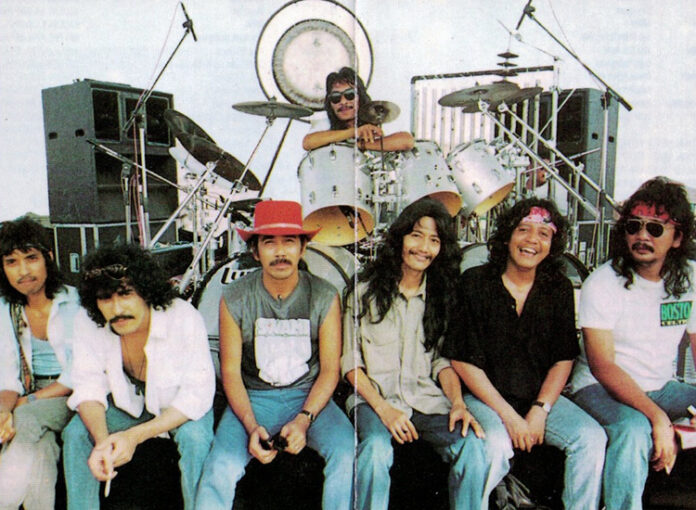It was the most spectacular cultural event seen in Indonesia’s capital in a generation—the modern energy of a fabled rock festival moment in the West, mixed with the hopes of freedom that, for one Javanese night, resisted the decades-old Suharto military regime.
Yet none of the energised festival-goers at Jakarta’s historic Senayan stadium in June 1990 could have predicted they were sparking the final decade of resistance to a brutal, often bloody New Order regime that would end a few years later.
For singer-songwriter Sawung Jabo, 70, now living in Sydney, those bygone sweaty nights with his former supergroup Kantata Takwa have stretched into the artforms he still practises in Marrickville today. As a result, there has been a continuum in threads of sounds, music, theatre and poetry that have been his trusted amulets linking Sydney, Yogyakarta, Jakarta, Bali, and Surabaya over decades of creative endeavour. Born Muhamad Djohansyah in Surabaya in 1951, his stage name, Sawung Jabo, has long been his indivisible persona.
Back in 1990, during those historic stadium shows, Jabo was in a different realm. Indonesians were restless for a new decade of freedom, demanding liberation from the oppressive Suharto regime. Jabo ushered in the decade with the warm reception for his debut album with music group (and Kantata Takwa predecessor) Swami. He co-founded Swami with national youth icon Iwan Fals. Their eponymously titled album became a huge hit, selling well over 100,000 copies. (I would meet Jabo and Iwan for the first time in Jakarta soon after that grand debut. I used rough Western shorthand to place the pair for a foreign context, contrasting Jabo as the Bruce Springsteen to Iwan’s Bob Dylan. Much later, Rolling Stone Indonesia would frame them the same way.)
Swami would soon morph into the rock spectacle Kantata Takwa, a ‘supergroup’ featuring famous dissident poet and playwright W.S. Rendra, plus rock impresario and sometimes oil tanker tycoon Setiawan Djody, keyboard whiz Jockie Suryoprayogo, bassist Donny Fatah, and Javanese drum maestro, Innisisri.
Australian folk/jazz musician and teacher Margaret Bradley was there for the Kantata Takwa concert in June 1990. She vividly remembers how Jakarta was “on edge”. After several violent crackdowns by the military regime on civilians in the weeks leading up to the concert, the atmosphere was “simmering to the boil, all vibed up,” she recalls.
The shows are still spoken about today as a pivotal event when Indonesian culture changed for the better, fleetingly liberated by rock music and inadvertently loosening the constraints of the New Order military regime’s decades of authoritarian rule. Those hot nights kicked off the decade, ending Suharto’s 33 often bloody years in power by its end.
***
With the group’s debut album reportedly selling over half a million copies, Kantata Takwa’s songs were popular among young Indonesians rebelling against a corrupt military regime. It was a type of identifiable modern poetry. For many, it was the first time Western rock music and its urgent pulse melded to the burgeoning Indonesian narrative as the people forged democracy on the streets of its cities.
Songs like ‘Bongkar’ (Tear It Down), ‘Kuda Lumping’, ‘HIO’, and ‘Bento’ came across like a new decade’s musical articulation of Rendra’s dissident poetry and theatre, that had been banned by General Suharto’s regime throughout the 1970s. Although the Suharto regime was seldom ever name-checked on stage, audiences understood the stories told in songs about dispossession, corruption, and the hypocrisy of the ruling class. Moreover, these songs came to characterise the ‘reformasi’ (or democratisation reform) movement led by Indonesian students that triumphed in 1998 amid the Asian Financial Crisis, which forced General Suharto from power.
Jabo is typically modest about how these songs, which he co-wrote with Iwan, are ‘reformasi’ anthems. He explains that creating art that resonates with “the common folks” is a continuous process. It’s a practice he has lived by since he busked for a living straight out of high school in Jakarta and Yogyakarta, learning the stories of petty criminals, mobsters and sex workers around him, similar to Iwan’s background as a street busker.
“Because I was partnering with Iwan Fals, who was a superstar and loved the kind of music I did,” Jabo explains, “we ended up writing songs together that became big hits. We protested the militaristic totalitarian (Suharto) government in our songs, and people agreed with what we were saying. They said, ‘you represent us!’ We were so grateful, so honoured for that.”
***
Over the past 40 years, Jabo has connected the dots by linking Indonesia to Australia’s ancient past. His songs and theatrical work correlate with the Indigenous songlines that map our shared realities. Most recently, Jabo is revelling in the peaceful process of collaboration and daily rituals of art production, workshopping a performance piece for fellow Indonesian-Australian artist Jumaadi’s show at Adelaide’s recent OzAsia Festival.
Today, the Swami and Kantata Takwa songs that Sawung Jabo co-wrote and performed are still part of democratic Indonesia’s street soundtrack. His music is invoked decades later by new generations of students demonstrating against threats to Indonesia’s hard-won democracy, defending their rights and protesting against corruption against current President Joko Widodo.
In Sydney, looking back at those years that gave birth to today’s uncertain Indonesian democracy and the crucial role Jabo has played in articulating that turmoil, he’s grateful to have made music during a critical time in Indonesia’s modern history. “I am a musician, I make music, I make art. I’m humbled when the people say we represent them.”
This interview with Sawung Jabo was conducted on the unceded lands of the Gadigal people of the Eora Nation.
***
This interview is from Diversity Arts Australia‘s Pacesetters Creative Archives project. Support for Stage 1 is from Create NSW.











